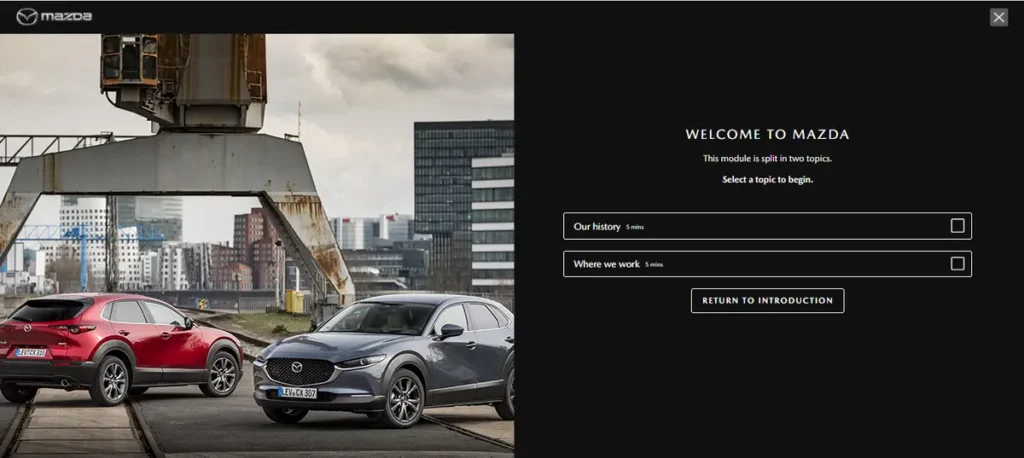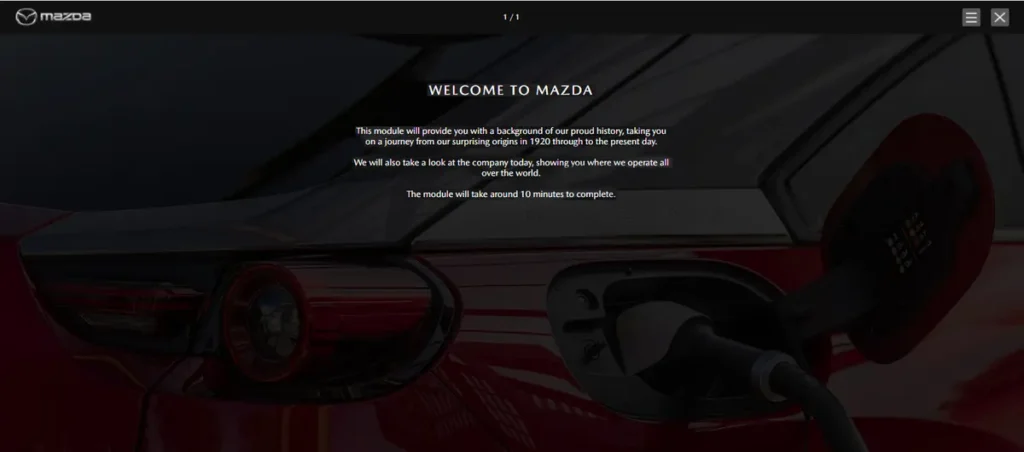The work described in this case study was performed by LEO Learning prior to becoming part of GP Strategies.
Mazda is a multinational Japanese car manufacturer known throughout the world for highly efficient and fun-to-drive vehicles. With a rich history entwined with the historic events in Hiroshima, Mazda has a proud history of standing the test of time and building resiliency into each of its products. The key philosophy driving this automotive business is the idea of the driver and car as one—a philosophy that translates into its customer service and advisory approach.
Challenge
Mazda’s customer service team is split into different functions. While the company had a range of training for its teams who made the initial sales, it wanted to create something specifically for the Service Advisor team members. Within the industry, it is common for Salespeople and Service Technicians to have their own specialized training, but Service Advisors can be overlooked. At Mazda, Service Advisors are critical to generating repeat revenue and retaining customer loyalty, so it was important to ensure they feel valued.
Culture and history are incredibly important to Mazda and needed to form the backbone of this training content. From the ethos of Jinba-Ittai (‘the driver and car as one’) through to Mazda’s historical HQ location of Hiroshima, it was essential that LEO Learning created modules focusing on history and culture as part of the onboarding process.
It was important for the content—as well as access to it—to be specific to the Service Advisors. Ease of use was also a vital component. Mazda already has an LMS in place, so this training and the portal it is accessed through needed to sit on top of the LMS itself.
On top of all of this, the curriculum needed to be localized on a European scale, with Mazda dealerships and business units operating across a vast number of countries. This includes changing spellings, adjusting references, and ensuring compliance is met across different legal jurisdictions.
Solution
Five LEO team members, including three instructional and learning designers, met with the learning team and various subject matter experts (SMEs) at Mazda to get a clearer understanding of exactly what was needed. The team conducted 18 separate hour-long workshops with the SMEs for each of the required modules. The design team then set about scoping out an eLearning series that would establish Mazda’s history and culture alongside customer service and retention essentials.
The 18 eLearning modules covered Mazda’s history, culture, internal systems, and processes, as well as a range of customer-care-specific skills. Each module was created in consultation with an individual Mazda SME and, with that level of collaboration already in place, the design process moved quickly.
On top of the eLearning modules, the LEO design team created a learning portal that would sit on top of Mazda’s LMS. This allows the Service Advisors to access their role-specific training within the same system as any other learning they’ve completed, with a different look and feel layered over the top. This custom portal creates a sense of importance, relevance, and specificity to the training.
A top priority was ensuring that the portal was easy to use for service advisors in the European markets. As such, a Netflix-style model of both design and module categorization was created. The categories included ‘Mandatory’, ‘Recommended’, ‘Other’, and ‘Completed’.
The content was dynamically designated categories, depending on the user’s performance in a specific diagnostic module. This allowed for ease of access and a type of interface that Service Advisors across a range of countries has likely already interacted with.
As this training was created for a European audience, the modules were designed in a way that could be easily translated, edited, and localized to each location or group of locations. We also provided Mazda with the tools to translate, edit, and localize the content as they need to. The first to roll out were the English-speaking markets, followed by the European markets, which require local translation.
In addition to the digital learning components, the LEO team also created a set of resources to enable live learning delivery at Mazda. This included slide decks and training guides to help the L&D team at Mazda supplement the eLearning modules and turn the learning journey into a blend, either online or partially online and partially in person.


Results
As the first set of eLearning modules and the portal have only recently been rolled out across Europe, it’s too early to draw conclusive results. However, LEO worked very closely with the Mazda team, which is very happy with the results. The Mazda L&D team has received widespread positive feedback from end-users of the portal and eLearning courses, including suggestions that the portal could be used for further employee groups, such as sales advisors. The L&D team is looking to create more live training sessions to build on the work we’ve done together.
One staff member even described the portal and eLearning modules as “something [they were] looking for when [they] first started at Mazda because [they] needed to know what was expected of a Service Advisor”.


